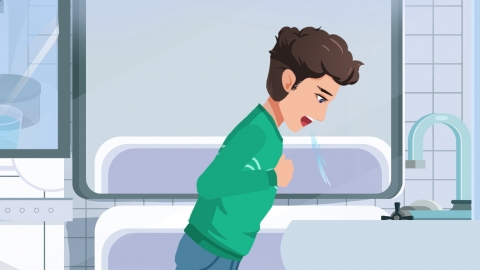What causes a prolonged cough after a viral infection?
Generally, prolonged cough after a viral infection may be caused by slow repair of respiratory mucosa, increased airway sensitivity, airway hyperresponsiveness, bronchitis, or the recovery phase of viral pneumonia. It is recommended to seek timely medical advice to identify the underlying cause and receive appropriate treatment under a doctor's guidance. A detailed explanation is as follows:

1. Slow repair of respiratory mucosa: Viral infections can damage the respiratory mucosa, exposing submucosal nerves. Continuous stimulation during the repair process can lead to prolonged coughing, accompanied by throat discomfort and dry cough. Avoid smoking and exposure to smoke, dust, and other irritants. Drink plenty of warm water to keep the respiratory tract moist. If necessary, take medications such as dextromethorphan hydrobromide tablets, pentoxifylline citrate tablets, or pholcodine oral solution as directed by a physician to relieve coughing.
2. Increased airway sensitivity: After a viral infection, airway mucosa may be damaged, increasing sensitivity to irritants such as cold air and cooking fumes, which can cause recurrent coughing that worsens upon exposure to irritants. Wear a mask when outdoors to reduce irritation, maintain a suitable indoor humidity level, and avoid excessive use of air conditioning. When coughing is significant, take antihistamines such as loratadine tablets, cetirizine hydrochloride tablets, or ebastine tablets as directed by a physician to reduce airway sensitivity.
3. Airway hyperresponsiveness: Viral infections can induce airway smooth muscle contraction and mucosal edema, leading to increased airway reactivity and paroxysmal coughing, which may worsen at night or in the morning. Avoid strenuous exercise and emotional excitement. Use medications such as budesonide-formoterol powder inhaler, salbutamol aerosol, or montelukast sodium tablets as directed by a physician to dilate the airways, reduce inflammation, and lower airway reactivity.
4. Bronchitis: Following a viral infection, the airway's defense function may decline, leading to secondary bacterial infection and bronchitis. Inflammatory stimulation of the bronchial mucosa can cause prolonged coughing, accompanied by sputum production and chest tightness. Patients should take antibiotics such as amoxicillin-clavulanate potassium tablets, cefuroxime axetil tablets, or azithromycin dispersible tablets as directed by a physician to treat the infection.
5. Recovery phase of viral pneumonia: Viral infections affecting the lungs can lead to pneumonia. During recovery, incomplete absorption of pulmonary inflammation may leave residual inflammation that irritates the respiratory tract, causing prolonged coughing, accompanied by fatigue and mild chest tightness. Rest adequately, avoid overexertion, and enhance nutrition. Take medications such as carbocisteine oral solution or Pulilike mixture as directed by a physician to promote inflammation absorption. Nebulizer therapy may be necessary to improve respiratory symptoms.
In daily life, keep warm to avoid colds that may worsen coughing. Engage in mild physical activities like walking to enhance physical fitness. Maintain a light diet, avoid spicy and irritating foods, and consume more vegetables and fruits rich in vitamins to aid respiratory mucosa repair and alleviate coughing symptoms.








